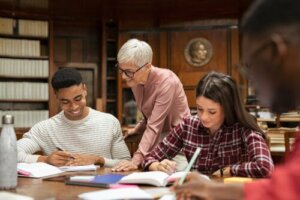How to Encourage the Academic Self-Knowledge of Students


Written and verified by the psychologist Ana Couñago
Self-concept is the perception you have of yourself in terms of physical, cognitive, social, affective, etc. characteristics. Therefore, it consists of various dimensions that are considered relevant in people’s lives. So, when we talk about self-concept in children, adolescents, and young people, we must take into account the dimension regarding studies. And it’s very important that they reflect on this aspect. Do you know how? In the following article, we’ll present an exercise to promote academic self-knowledge in students.
“Of all knowledge, the wise and good seek mostly to know themselves.”
-William Shakespeare-
Academic self-concept
Academic self-concept is one more dimension of self-concept when it comes to people who are studying. It refers to the student’s perception of their own ability to assume responsibilities and perform tasks related to the academic field. This depends on their assessment of their own performance, successes, and school expectations.
In addition, there are other factors that influence the formation of academic self-concept, such as:
- Parental expectations and demands regarding academic results
- Family support in their studies
- The opinions and perceptions of teachers and classmates
- Comparison with other classmates
- Comparison with one’s own previous school results
- The relationship between the results they obtain and the effort they make
Depending on all this, a student creates an academic self-concept of two types:
- Positive: Shows greater motivation, interest, and confidence when facing school challenges.
- Negative: They have fewer personal, cognitive, and motivational resources to overcome school challenges.
The fact that a student forms a positive or negative self-concept is a determining factor for their learning and school performance. Therefore, it’s very important, both at home and at school, that this issue is dealt with delicately.
“Your chances of success in any undertaking can always be measured by your belief in yourself.”
-Robert Collier
How can we help students to reflect on their own academic self-concept? First, they must know themselves very well in this regard. To this end, here’s a very simple exercise to promote self-knowledge in the academic environment.
Promoting academic self-knowledge in students
Knowing oneself is fundamental to achieving success. This can also be applied when we talk about the academic field. People need to know themselves very well as students in order to be able to enhance their strengths, deal with weaknesses, believe more in themselves, and, therefore, increase performance and obtain better school results.
An exercise to help students know themselves academically
To achieve this, they must first think about and analyze their own abilities and skills as students. An ideal exercise to carry out such reflection consists of asking the students to do the following:

- Draw two columns on a blank sheet of paper.
- At the top of one of the columns write “I am not able to…” or “I find it difficult to…”.
- At the top of the other column write: “I am able to…” or “I am good at…”.
- Complete each of the columns and make a list of things that you find difficult to do and another list of things that you think you’re good at doing in school and while studying.
- Analyze what you’ve written in the first column and think about what you can do to change or improve the things you don’t excel at.
By doing this, students can understand and reflect on their strengths and weaknesses related to studying and thus create a vision of themselves as learners.
It’s important to note that if the student has a negative academic self-concept, they’ll have an easier time covering the column of things they’re not capable of doing. On the other hand, if a student has a positive academic self-concept, the exact opposite will occur.
As a mother, father, or teacher, what do you think about suggesting this exercise to your children or students? We’re sure you’ll discover some very interesting things!
Self-concept is the perception you have of yourself in terms of physical, cognitive, social, affective, etc. characteristics. Therefore, it consists of various dimensions that are considered relevant in people’s lives. So, when we talk about self-concept in children, adolescents, and young people, we must take into account the dimension regarding studies. And it’s very important that they reflect on this aspect. Do you know how? In the following article, we’ll present an exercise to promote academic self-knowledge in students.
“Of all knowledge, the wise and good seek mostly to know themselves.”
-William Shakespeare-
Academic self-concept
Academic self-concept is one more dimension of self-concept when it comes to people who are studying. It refers to the student’s perception of their own ability to assume responsibilities and perform tasks related to the academic field. This depends on their assessment of their own performance, successes, and school expectations.
In addition, there are other factors that influence the formation of academic self-concept, such as:
- Parental expectations and demands regarding academic results
- Family support in their studies
- The opinions and perceptions of teachers and classmates
- Comparison with other classmates
- Comparison with one’s own previous school results
- The relationship between the results they obtain and the effort they make
Depending on all this, a student creates an academic self-concept of two types:
- Positive: Shows greater motivation, interest, and confidence when facing school challenges.
- Negative: They have fewer personal, cognitive, and motivational resources to overcome school challenges.
The fact that a student forms a positive or negative self-concept is a determining factor for their learning and school performance. Therefore, it’s very important, both at home and at school, that this issue is dealt with delicately.
“Your chances of success in any undertaking can always be measured by your belief in yourself.”
-Robert Collier
How can we help students to reflect on their own academic self-concept? First, they must know themselves very well in this regard. To this end, here’s a very simple exercise to promote self-knowledge in the academic environment.
Promoting academic self-knowledge in students
Knowing oneself is fundamental to achieving success. This can also be applied when we talk about the academic field. People need to know themselves very well as students in order to be able to enhance their strengths, deal with weaknesses, believe more in themselves, and, therefore, increase performance and obtain better school results.
An exercise to help students know themselves academically
To achieve this, they must first think about and analyze their own abilities and skills as students. An ideal exercise to carry out such reflection consists of asking the students to do the following:

- Draw two columns on a blank sheet of paper.
- At the top of one of the columns write “I am not able to…” or “I find it difficult to…”.
- At the top of the other column write: “I am able to…” or “I am good at…”.
- Complete each of the columns and make a list of things that you find difficult to do and another list of things that you think you’re good at doing in school and while studying.
- Analyze what you’ve written in the first column and think about what you can do to change or improve the things you don’t excel at.
By doing this, students can understand and reflect on their strengths and weaknesses related to studying and thus create a vision of themselves as learners.
It’s important to note that if the student has a negative academic self-concept, they’ll have an easier time covering the column of things they’re not capable of doing. On the other hand, if a student has a positive academic self-concept, the exact opposite will occur.
As a mother, father, or teacher, what do you think about suggesting this exercise to your children or students? We’re sure you’ll discover some very interesting things!
All cited sources were thoroughly reviewed by our team to ensure their quality, reliability, currency, and validity. The bibliography of this article was considered reliable and of academic or scientific accuracy.
- Santana-Vega, L. E., Feliciano-García, L. A. y Jiménez-Llanos, A. B. (2009). Autoconcepto académico y toma de decisiones en el alumnado de bachillerato. REOP-Revista Española de Orientación y Psicopedagogía, 20(1), 61-75.
This text is provided for informational purposes only and does not replace consultation with a professional. If in doubt, consult your specialist.








